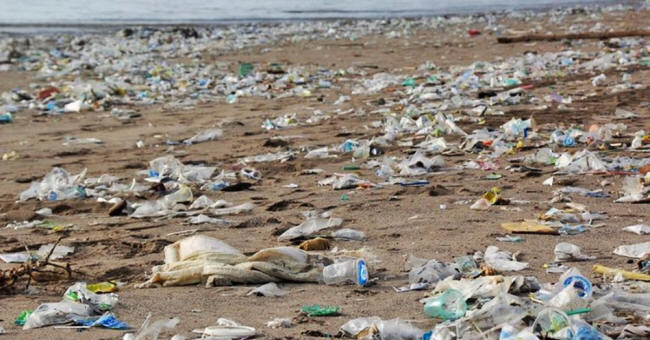|

by Elias Marat
May 14, 2019
from
TheMindUnleashed Website

As awareness increases across the globe about
the growing crisis of plastic waste,
one would think that it would be common sense for nations to come to
some form of agreement to limit plastic pollution.
Such was the case last Friday when over 180 countries joined a
historic United Nations agreement to take new steps to monitor and
track plastic waste beyond their borders and regulate its trade.
However, the U.S. was one of only a handle of countries that
refused to join the agreement,
which took the form of an amendment to the
Basel Convention on the Control
of Transboundary Movements of Hazardous Waste and their Disposal,
a convention backed by 187 countries
excluding the U.S.
The U.S. is currently the top exporter of plastic waste, according
to advocacy group
Break Free From Plastic.
While the U.S. was
present at the negotiations for the amendment, as a non-signatory to
the convention it was unable to vote. However, U.S. representatives
argued against the measure, claiming that the agreement would harm
the trade in plastic waste.
According to the UK
Independent, UN Environment's
Executive Secretary of the three conventions Rolph Payet
hailed the "historic" amendment and said it would send a,
"very strong
political signal to the rest of the world - to the private
sector, to the consumer market - that we need to do something."
Plastics and
microplastics have
inundated the world's oceans and water supplies,
leaching carcinogenic toxins and chemicals into the marine
environment, with plastic drink containers trapping and confining -
and ultimately killing - marine wildlife.
The pollution has reached such massive proportions that an estimated
100 million tons of plastic can now be found in the oceans,
according to the UN. Between 80 and 90 per cent of it comes from
land-based sources.
According to a report prepared for the 2016 World Economic Forum
in Davos, Switzerland, by 2050 it is estimated that plastic
waste in the ocean will outweigh all fish.
Payet continued:
"Countries have
decided to do something which will translate into real action on
the ground."
A wide array of products
in various industries will be affected by the deal, including but
not limited to food and beverages, fashion, aerospace, health care,
high technology, and motor vehicles.
Customs agents will
likely be instructed to look out for electronics and other forms of
potentially hazardous waste that previously faced less scrutiny in
transnational trade.
While the United States abstained from signing on to the deal, it
will feel its effects as it attempts to ship plastic waste to those
countries that were signatories to the convention.
Exporters like the U.S.
will now have to obtain consent from any countries receiving
unrecyclable, contaminated, or mixed plastic waste - a major change
from the current situation which allows the U.S. and other countries
to ship low-quality plastic waste to private entities in the
Global South, according to
The Guardian.
Paul Rose, the expedition leader of the National
Geographic Pristine Seas Expeditions, told the Independent
that shifting tides of public opinion helped ensure a consensus
during the negotiations.
Rose said:
"It was those iconic
images of the dead albatross chicks on the Pacific Islands with
their stomachs open and all recognizable plastic items inside
it, and most recently, it's been when we discovered the nano-particles
do cross the blood-brain barrier, and we were able to prove that
plastic is in us."
In a
press release, Payet
also credited an online petition entitled "Stop
dumping plastic in paradise!",
which gained nearly one million signatures, as indicating the high
level of public awareness and demands for action.
However, as
fracked natural gas supplies increase in the
United States, the cost of producing and exporting plastics has
become cheaper, making the plastic market hugely profitable and
attractive once again for multinational fossil fuel and
petrochemical industries...
| 

